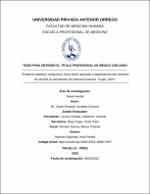| dc.contributor.advisor | Ramírez Espínola, Ana Fiorella | |
| dc.contributor.author | Zavaleta Corvera, César Eduardo | |
| dc.creator | Zavaleta Corvera, César Eduardo | |
| dc.date.accessioned | 2022-04-04T00:07:08Z | |
| dc.date.available | 2022-04-04T00:07:08Z | |
| dc.date.issued | 2022 | |
| dc.identifier.uri | https://hdl.handle.net/20.500.12759/8797 | |
| dc.description.abstract | El objetivo de la presente investigación fue determinar si el trastorno
obsesivo compulsivo fue un factor asociado a la dependencia del consumo de
alcohol en estudiantes de medicina humana de la Universidad Privada Antenor
Orrego de Trujillo durante el año 2021.
Material y Métodos: Se desarrolló un estudio observacional en 209 alumnos de las
asignaturas de Morfofisiología I y II de la Universidad Privada Antenor Orrego. La
estadística descriptiva comprendió el análisis de frecuencias (porcentajes). Para el
análisis ligado a la hipótesis se empleó la prueba no paramétrica de Chi Cuadrado,
determinando significancia estadística para un valor p < 0,05.
Resultados: En la presente investigación se realizó una recolección de datos a
través de una encuesta virtual a un total de 209 participantes estudiantes de
Medicina Humana de la Universidad Privada Antenor Orrego que cursaban o
cursaron las asignaturas de Morfofisiologia I y II durante el año 2021. Se pudo
encontrar a partir de la información adquirida que el 3%(n=6) de la población
encuestada tuvieron dependencia al consumo de alcohol. El grupo del sexo
masculino fue el predominante con 3%(n=6) así como el grupo de entre 20 a 29
años representaba el 2% de la dependencia al consumo de alcohol, la procedencia
urbana 5(2%), el estado civil en valores de 8(4%) y la condición socioeconómica de
pobreza de 5(2%). De todas ellas encontramos que el sexo masculino(p=0.022),
edad de 20-29 años(p=0.003) y condición social pobre(p=0.000) fueron
estadísticamente significativas a la asociación. En el análisis bivariado de
asociación se encontró que del 3%(n=6) de estudiantes que tuvieron dependencia
al consumo del alcohol todos ellos resultaron positivos para TOC, mientras que del
97%(n=203) que no presentaron dependencia al consumo de alcohol solo resultaron
positivos el 9%(n=19). El 88%(n=184) restante de estudiantes no fueron
diagnosticados ni con TOC ni con dependencia al consumo de alcohol
Conclusión: El trastorno obsesivo compulsivo fue un factor asociado a la
dependencia del consumo de alcohol en estudiantes de medicina humana. | es_PE |
| dc.description.abstract | The objective of the present investigation was to determine if obsessive
compulsive disorder is a factor associated with alcohol dependence in students of
human medicine of the Private University Antenor Orrego de Trujillo during the year
2021.
Material and Methods: It was developed an observational study in 209 students of
the subjects of Morphophysiology I and II. Descriptive statistics included the analysis
of frequencies (percentages). For the analysis linked to the hypothesis, the non parametric Chi Square test was used, determining statistical significance for a p
value <0.05.
Results: In the present investigation, a data collection was carried out through a
virtual survey of a total of 209 participating Human Medicine students of the
Antenor Orrego Private University who were taking or took the subjects of
Morphophysiology I and II during the year 2021. It was possible find from the
information acquired that 3% (n = 6) of the surveyed population had dependency
on alcohol consumption. The male group was predominant with 3% (n = 6) as well
as the group between 20 and 29 years old represented 2% of dependence on
alcohol consumption, urban origin 5 (2%), marital status in values of 8(4%) and the
socioeconomic condition of poverty of 5(2%). Of all of them we found that the male
sex (p=0.022), age 20-29 years (p=0.003) and poor social status (p=0.000) were
statistically significant to the association. In the bivariate analysis of association, it
was found that of the 3% (n=6) of students who had dependence on alcohol
consumption, all of them were positive for OCD, while 97% (n=203) who did not
present dependence on alcohol consumption alcohol, only 9% (n=19) were
positive. The remaining 88% (n=184) of students were not diagnosed with OCD or
alcohol dependence
Conclusion: Obsessive compulsive disorder is a factor associated with alcohol
dependence in students of human medicine | en_US |
| dc.description.uri | Tesis | es_PE |
| dc.format | application/pdf | es_PE |
| dc.language.iso | spa | es_PE |
| dc.publisher | Universidad Privada Antenor Orrego | es_PE |
| dc.relation.ispartofseries | T_MED_3127 | |
| dc.rights | info:eu-repo/semantics/openAccess | es_PE |
| dc.rights.uri | https://creativecommons.org/licenses/by/4.0/ | es_PE |
| dc.source | Universidad Privada Antenor Orrego | es_PE |
| dc.source | Repositorio Institucional - UPAO | es_PE |
| dc.subject | Trastorno Obsesivo Compulsivo | es_PE |
| dc.subject | Consumo de Alcohol | es_PE |
| dc.title | Trastorno obsesivo compulsivo como factor asociado a dependencia del consumo de alcohol en estudiantes de medicina humana. Trujillo, 2021 | es_PE |
| dc.type | info:eu-repo/semantics/bachelorThesis | es_PE |
| thesis.degree.level | Título Profesional | es_PE |
| thesis.degree.grantor | Universidad Privada Antenor Orrego. Facultad de Medicina Humana | es_PE |
| thesis.degree.name | Médico Cirujano | es_PE |
| thesis.degree.discipline | Medicina Humana | es_PE |
| dc.subject.ocde | https://purl.org/pe-repo/ocde/ford#3.02.27 | es_PE |
| renati.advisor.orcid | https://orcid.org/ 0000-0002-3889-2097 | es_PE |
| renati.author.dni | 72892683 | |
| renati.advisor.dni | 41135641 | |
| renati.type | https://purl.org/pe-repo/renati/type#tesis | es_PE |
| renati.level | https://purl.org/pe-repo/renati/level#tituloProfesional | es_PE |
| renati.discipline | 912016 | es_PE |
| renati.juror | Lozano Peralta, Katherine Yolanda | |
| renati.juror | Moya Vega, Víctor Raúl | |
| renati.juror | Serrano García, Marco Orlando | |
| dc.publisher.country | PE | es_PE |


